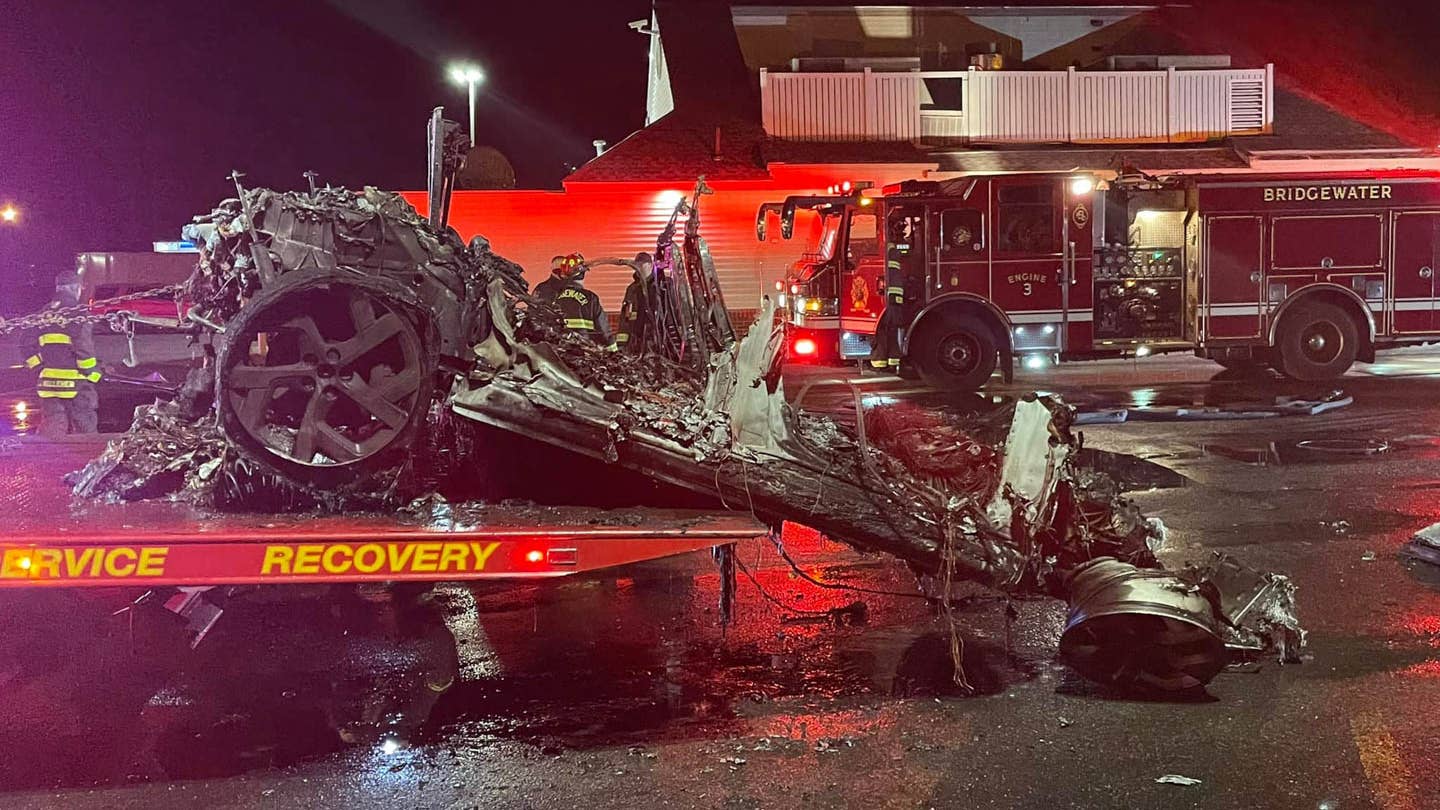New Lucid Air Dream Edition Burns Down During Transport, Cause Unknown
An eyewitness says the electric car burned for four hours.

Electric vehicle fires make big headlines because oftentimes, they're incredibly difficult to extinguish. Such was the case with one Lucid Air in Massachusetts that caught fire and totally torched the trailer it was in, not to mention the siding of a nearby building. It was shared around Facebook like crazy after photos were posted by the Highway to Hell account, and we reached out to Lucid for more info. Right now, the cause of the fire is unverified; however, it's believed to have originated in the tow vehicle's engine bay.
Regardless of what caused the incident, the Lucid's lithium-ion batteries were the trickiest to put out, allegedly taking as long as four hours to quit burning. According to the Facebook post, the fire department struggled with the flames as the Lucid's battery pack kept reigniting, something we've seen with electric vehicles before. A towing company was finally able to pick up the charred Lucid and drop it in a dumpster after that, where it was then doused by fire hoses.
No injuries were reported, which is the most important thing to note, and there didn't seem to be any other cars involved. In the photos provided, the enclosed trailer looks empty aside from the Lucid.
Judging by the wheels on the torched car, it was a Lucid Air Dream Edition, the longest-range, most powerful version of the luxury EV. After the fire, though, there was nothing left but its skateboard platform and its wheels. Event the pickup used to haul the carrier was melted down to its ladder frame, engine, and wheels. With this car gone, that means there are a maximum of 519 Air Dream Editions left of the 520 Lucid made.
Len Devanna, Lucid's head of digital experience, tweeted that the Air might not have been the source of the initial fire:
Like all things on the internet and social media, this ordeal has led people to argue about everything from the dangers of EVs to the politics that promote them. Lucid fans claim the Air couldn't possibly have started the fire, while skeptics are claiming any EV could spontaneously combust and burn everyone's houses down. Regardless, none of it is helpful for the customer who lost their car, the transport driver who lost their truck and trailer, or the business whose building sustained damage.
There's a proven misconception that electric vehicles are more prone to catching fire than their gas or diesel counterparts. No data supports that stance, and while fires involving lithium-ion batteries are usually more challenging to fight than those with internal combustion engines, a lot of it can be attributed to the firefighting supplies available. There's also the fact that these fires burn hotter than ones fueled by gasoline—3,632 degrees Fahrenheit, according to Envista Forensics, versus the 1,733 degrees Fahrenheit that Columbus Fire and Safety cites for gasoline-fueled flames.
In reality, EVs appear to be the least likely vehicles to catch fire according to a report from AutoInsuranceEZ, which studied collective data from the National Transportation Safety Board, Bureau of Transportation Statistics, and government recall data. Hybrids actually catch fire more than any other vehicle type, per 100,000 sales, with internal combustion engines coming in at a close second, and EVs in a distant third.
Updated @ 12:45 p.m. ET on 04/27/2022: This article previously contained an incorrect sentence about the potential effects of extinguishing a lithium-ion battery fire with water. It has since been removed.
Got a tip or question for the author? Contact them directly: nico.demattia@thedrive.com
